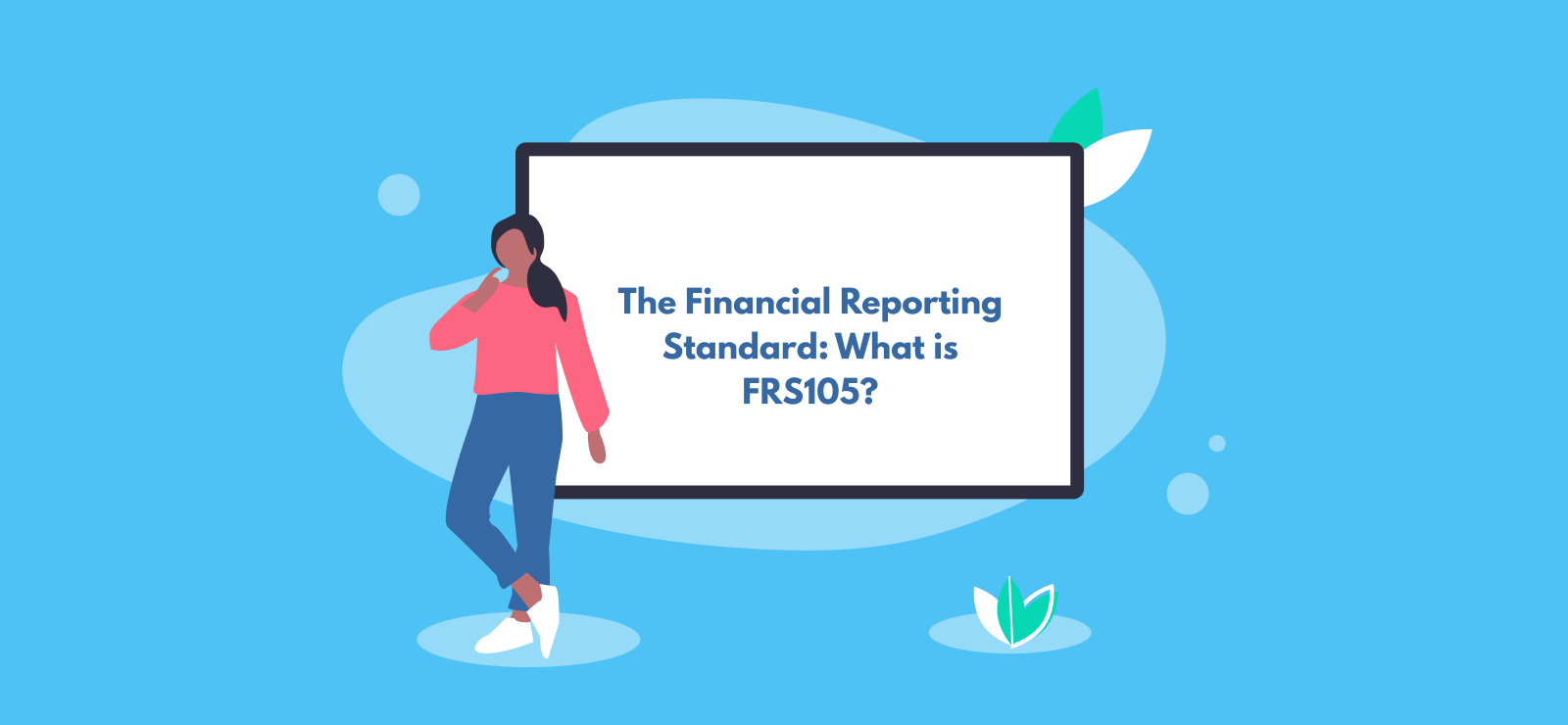

The Financial Reporting Standard: What is FRS 105?
Our frequently asked accounting and bookkeeping questions blog series is designed to make running your business as simple and stress-free as possible, and to help you understand all the jargon you might encounter in the process of running your business.
In this article, we explain all things Financial Reporting Standard (FRS 105). Let’s get stuck in!
What is the Financial Reporting Standard (FRS 105)?
FRS 105 is a specific type of Financial Reporting Standard that was developed by the UK’s Financial Reporting Council (FRC).
It applies to ‘micro-entities’ – more on what these are in just a moment – and in a nutshell, provides those who qualify with a quicker, simpler, and more cost-effective way of managing financial statements and reporting.
The main benefits for those that fall within FRS 105 include:
- Simplified accounting requirements: FRS 105 allows micro-entities to file a more straightforward set of accounts, more stripped back than the accounts small, medium and large companies have to keep.
- Lower costs: Simpler and more streamlined accounting requirements naturally mean micro-entities are able to spend less money on preparing and submitting their financial records to HMRC than their counterparts.
- Improved understanding of financial performance: As financial accounts are more straightforward for micro-entities under FRS 105, this means they’re also easier to understand. As a result, micro-entities can really get to grips with what all the different metrics mean so they can then apply this knowledge to their business growth strategy.
- Access to funding: Sometimes, micro-entities that comply with FRS 105 regulations can find it easier to access funding from banks and other sources.
Who does FRS 105 apply to?
The Financial Reporting Standard is only applicable to limited companies that qualify as a micro-entity, based in the UK.
What makes a micro-entity?
This depends on the accounting period, so we’ll put the dates under separate headings to make things easier.
Micro-entities in accounting periods between 30th September 2013 to 5th April 2025
In order for HMRC to classify your limited company as a micro-entity for accounting periods between 30th September 2013 to 5th April 2025, you need to meet two or more of the following criteria:
- Have a turnover of £632,000 or less (this can be adjusted if the financial year is less or more than 12 months).
- Have £316,000 or less on your company’s balance sheet, including fixed assets and current assets.
- Have 10 employees or fewer working for your company.
Accounting periods which begin on or after 6th April 2025
For accounting periods which begin on or after 6th April 2025 a company counts as a micro-entity if it meets two or more of these:
- Annual turnover no more than £1 million
- A balance sheet total no more than £500,000
- No more than 10 employees on average
If your circumstances change and you can’t meet two or more of the above criteria anymore, you will no longer qualify as a micro-entity and will therefore no longer have access to the FRS 105 system or its benefits.
What accounts do micro-entities need to file under FRS 105?
Limited companies qualifying as micro-entities under FRS 105 are required to submit the following financial information to HMRC on an annual basis:
- Statement of Financial Position: A type of balance sheet detailing the company’s assets, liabilities, and equity relating to the accounting period being reported on.
- Income Statement: A type of profit and loss account detailing the company’s income and expenses for the same accounting period.
- Footnotes: These notes should outline any company director transactions that have taken place during the accounting period. This doesn’t need to be extremely detailed information; it can be a basic account.
All of this information needs to be submitted as part of your overall company year-end accounts filing process.
It’s also worth noting here that micro-entities don’t need to file a cash flow statement under FRS 105. However, you can still do so if you think it might be an effective way to provide useful information to anybody who uses your financial statements.
Micro-entities under FRS 105 also need to file their Statement of Financial Position (balance sheet) and the footnotes outlining director transactions with Companies House as well as HMRC.
Is FRS 105 compulsory for qualifying limited companies?
No, it isn’t mandatory for a limited company that meets the micro-entity criteria to use the FRS 105 accounting standard, it is a choice.
A common reason why a limited company may not choose to file under FRS 105 is if it’s working with a third party (such as an investor) who requires more detailed financial records from the company.
In this case (and similar), a limited company can use Financial Reporting Standard FRS 102 instead. This requires more complex and detailed financial information to be compiled and documented.
Understanding how to report your finances correctly is crucial. Unsure? Reach out to a professional. Call 020 3355 4047 to speak to one of the team about our online accounting and bookkeeping services or get an instant online quote.
Want to learn more?
Subscribe to our newsletter to get accounting tips like this right to your inbox

Read more posts...

Accounting for Cash Payments in UK Businesses
3rd March 2026Card machines, Apple Pay, and bank transfers may be the norm these days, but cash is far from dead. This blog breaks…
Read More
When Should I Submit My 2025/26 Self Assessment Tax Return?
2nd March 2026You don’t have to wait for the January deadline, and can submit your Self Assessment return as soon as the tax year…
Read More
Transferring Assets to A Limited Company
1st March 2026Incorporating your company is a big, exciting step, but there’s a bit of a hill to climb first before you can enjoy…
Read MoreConfirm Transactions
The number of monthly transactions you have entered based on your turnover seem high. A transaction is one bookkeeping entry such as a sale, purchase, payment or receipt. Are you sure this is correct?
Please contact our sales team if you’re unsure
VAT Returns
It is unlikely you will need this service, unless you are voluntarily registered for VAT.
Are you sure this is correct?
Call us on 020 3355 4047 if you’re not sure.
MTD IT Quarterly Updates
Your final, end of year MTD Income Tax submission is included in your fee, without this add-on service.
We would recommend you submit the quarterly updates yourself using Pandle or alternative bookkeeping software.
However, if you would prefer us to submit these quarterly updates for you, there is an additional fee of £35.00 per month.
Call us on 020 3355 4047 if you’re not sure.
Bookkeeping
You will receive our bookkeeping software Pandle for free, as part of your package.
You can use this to complete your own bookkeeping, or we can provide a quote to complete your bookkeeping for you.
Please select and option below:
Call us on 020 3355 4047 if you’re not sure.

